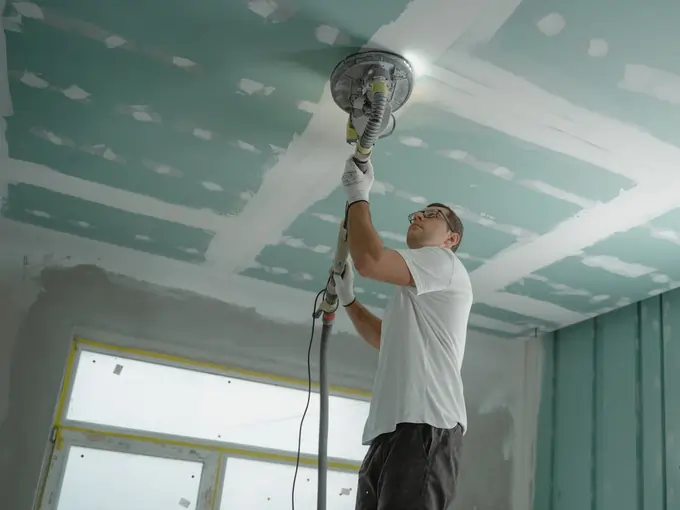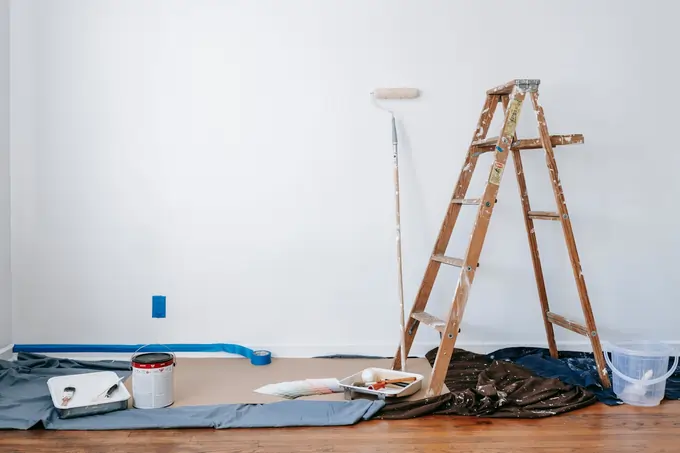Ever wondered what the heck Home Improvement Insurance is all about? It’s basically a safety net for when your DIY skills go south. Our guide breaks down everything you need to know, making sure your Home Improvement Insurance protects you from costly oopsies and unexpected disasters.
Dive in and get insured smartly!
Overview
Are you planning to give your home a fresh new look? Maybe you’re thinking about adding an extra room or upgrading your kitchen. Whatever your home improvement project may be, it’s crucial to consider home improvement insurance. This type of coverage can protect you from unexpected costs and risks that may arise during your renovation journey.
In this guide, we’ll dive deep into the world of home improvement insurance. We’ll explore what it is, why you need it, and how it works. By the end, you’ll have a clear understanding of how to protect your investment and ensure your home renovation project goes smoothly.
So, let’s roll up our sleeves and get started on this important topic that every homeowner should know about!
What is Home Improvement Insurance?
Home improvement insurance is a special type of coverage designed to protect you during renovation projects. It’s like a safety net that catches you if something goes wrong while you’re fixing up your home.
Think of it as an extra layer of protection on top of your regular homeowners’ insurance policy. While your standard policy covers many things, it might not be enough when you’re in the middle of a big renovation.
Different types of home improvement insurance
There are several types of insurance you might need for your home improvement project:
- General liability insurance: This covers accidents that might happen during the renovation, like if someone gets hurt on your property.
- Property insurance: This protects the structure of your home and the materials you’re using for the renovation.
- Professional liability insurance: If you’re hiring contractors, they should have this to cover any mistakes they might make.
- Workers’ compensation insurance: This is for the workers on your project, in case they get injured on the job.
Remember, the type of insurance you need can depend on the size and scope of your project. A small DIY job might not need as much coverage as a major renovation.
Why Do You Need Home Improvement Insurance?

Risks involved in home improvement projects
Home renovations can be exciting, but they also come with risks. Here are some reasons why you might need home improvement insurance:
- Accidents happen: Even if you’re careful, someone could get hurt during the renovation. Maybe a visitor trips over a tool, or a worker falls off a ladder.
- Property damage: Your home could be damaged during the work. For example, a contractor might accidentally break a pipe, causing water damage.
- Theft: Building materials and new appliances can be tempting targets for thieves.
- Incomplete work: Sometimes, contractors don’t finish the job. Insurance can help cover the cost of hiring someone else to complete the work.
The role of insurance in mitigating these risks
Home improvement insurance acts like a shield, protecting you from these potential problems. Here’s how it helps:
- It can help pay for medical bills if someone gets hurt on your property.
- If your home is damaged during the renovation, insurance can cover the cost to repair or rebuild your home.
- If materials or new items are stolen, insurance can help replace them.
- Some policies can even help if your contractor doesn’t finish the job.
By having the right insurance, you can focus on the exciting parts of your renovation without worrying about what might go wrong.
How Does Home Improvement Insurance Work?
So, here’s the deal with home improvement insurance. This insurance protects your home during the renovation. You usually have a standard homeowners policy, but you’ll likely need to increase your coverage because the cost to repair or replace stuff can go up.
When you do renovations, insurance generally requires you to get a certificate of insurance. So, insurance helps cover unexpected costs, and if you’re smart, there are also some discounts and savings you might qualify for. You’ll need to increase your coverage to avoid any financial surprises.
Process of getting insurance
Getting home improvement insurance is easier than you might think. Here’s a step-by-step guide:
- Contact your insurance company: Start by talking to your current homeowners insurance provider. They might be able to add coverage to your existing policy.
- Describe your project: Tell them about your renovation plans. Be specific about what you’re doing and how long it will take.
- Get a quote: Your insurance agent will give you an insurance quote based on your project details.
- Review the policy: Make sure you understand what’s covered and what’s not. Don’t be afraid to ask questions
- Choose your coverage: Decide on the amount of coverage you need. This might mean increasing your coverage limits.
- Pay the premium: Once you’re happy with the policy, you’ll need to pay the insurance premium to start your coverage.
Claiming insurance in case of damages

If something goes wrong during your renovation, here’s how to claim your insurance:
- Document the damage: Take photos and write down what happened.
- Contact your insurance company: Let them know about the incident as soon as possible.
- File a claim: Your insurance agent will guide you through the process of filing a claim.
- Get an assessment: An insurance adjuster might visit to assess the damage.
- Receive payment: If your claim is approved, you’ll receive payment to cover the damages, minus any deductible.
Remember, it’s always better to have insurance and not need it than to need it and not have it!
Factors to Consider When Choosing Home Improvement Insurance
When you’re thinking about home improvements, you need to increase your insurance to protect your investment. Home renovations can change your coverage needs, and your typical homeowners insurance policy might not cut it. You’ll want to get an insurance quote to make sure you’re covered.
If your renovation is a DIY project, or if you have a home renovation business, you’ll need insurance for that too. General contractors often need business insurance coverage that includes general liability coverage. It’s crucial to check insurance requirements for commercial jobs, whether using commercial property insurance or general liability coverage.
Think about the possible cost of rebuilding your home if it gets damaged by a covered risk. It’s important to know how much home insurance covers in such cases. You want to have the right coverage to protect your newly renovated home. In some cases, home insurance can cover these additional risks, but often, insurance coverage limits may need adjustment.
So, before you dive into that project, make sure to get a home insurance check-up. Shining a spotlight on home renovations can change your policy needs. This way, you know your home insurance can cover everything. Don’t skimp on risk insurance.
When selecting home improvement insurance, there are several key factors to keep in mind:
Coverage
The most important factor is what the policy covers. Here are some things to look for:
- Property coverage: This should protect your home and the materials you’re using for the renovation.
- Liability coverage: This protects you if someone gets hurt during the project.
- Personal property coverage: This covers your belongings that might be damaged or stolen during the renovation.
Make sure the policy covers all aspects of your specific project. For example, if you’re doing a major structural change, you might need different coverage than if you’re just updating your kitchen cabinets.
Cost
The cost of your insurance will depend on several factors:
- The size and scope of your project
- The value of your home
- Your location
- The length of the renovation
It’s better to pay a bit more for comprehensive protection than to be left underinsured if something goes wrong.
Company reputation
Choose an insurance company with a good reputation. Look for:
- Financial stability
- Good customer service ratings
- Quick claim processing times
You can check ratings from independent agencies like A.M. Best or read customer reviews online.
Policy limitations
Every policy has limitations. Make sure you understand:
- What’s not covered
- Any deductibles you’ll need to pay
- Maximum payout limits
For example, some policies might not cover damage caused by floods or earthquakes, or they might have a cap on how much they’ll pay for certain types of claims.
By considering these factors carefully, you can choose a policy that gives you the protection you need at a price you can afford.
Difference Between Home Improvement Insurance and Home Warranty
Alright, so what’s the deal with home insurance and home warranty? Simply put, home insurance coverage and home warranty serve different purposes when you want to insure your home. Homeowners insurance coverage helps protect the dwelling from damages like fires or storms, while a home warranty covers repairs or replacements for home systems like plumbing and electrical.
Your typical homeowners policy includes stuff like dwelling coverage and personal liability coverage, but when you start mixing in home renovation insurance or contractor insurance for a remodel, things can get a bit trickier. You’ll probably need to ask your insurance agent about contractor business insurance or if your insurance may increase.
Got a vacant home or doing work on it? That’s another layer. You may have to get small business insurance for the home improvement business doing the job. Sometimes, homeowners insurance coverage isn’t enough, and you’ll need a certificate of insurance. Think about consulting with American Family Insurance to see what insurance offers they have.
When protecting your home, it’s important to understand the difference between home improvement insurance and a home warranty. Let’s break it down:
Explanation of home warranty
A home warranty is a service contract that covers the repair or replacement of major home systems and appliances. Here’s what you need to know:
- It typically covers things like your HVAC system, electrical system, plumbing, and major appliances.
- You pay an annual fee, and then a service fee each time you need a repair.
- It’s designed for normal wear and tear, not for damages from accidents or disasters.
Comparison and contrast with home improvement insurance
While both offer protection for your home, they serve different purposes:
| Home Improvement Insurance | Home Warranty |
|---|---|
| Covers accidents and damages during renovation | Covers normal wear and tear of systems and appliances |
| Typically short-term, for the duration of the project | Usually annual, renewable contract |
| Covers liability if someone gets hurt | Doesn’t include liability coverage |
| Can cover theft of materials or new appliances | Doesn’t cover theft |
| May help if the contractor doesn’t finish the work | Doesn’t cover incomplete contractor work |
Home improvement insurance is specifically designed to protect you during renovation projects, while a home warranty is for ongoing maintenance and repairs.
For example, if a worker accidentally damages your roof during a renovation, home improvement insurance would likely cover it. But if your water heater stops working due to old age, that’s where a home warranty would come in handy.
In many cases, homeowners benefit from having both types of protection. Home improvement insurance gives you peace of mind during renovations, while a home warranty can help manage the cost of home repairs throughout the year.
Tips for Saving on Home Improvement Insurance
While home improvement insurance is crucial, there are ways to keep costs down without sacrificing coverage. Here are some smart strategies:
- Bundle your policies: Many insurance companies offer discounts if you bundle your home improvement insurance with your regular homeowners insurance or auto insurance.
- Increase your deductible: Choosing a higher deductible can lower your premium. Just make sure you can afford the higher out-of-pocket cost if you need to make a claim.
- Improve home security: Installing security systems or smoke detectors can sometimes lead to insurance discounts.
- Choose a reputable contractor: A contractor with a good safety record may help lower your insurance costs.
- Complete projects quickly: The longer your renovation takes, the more you’ll typically pay for insurance. Try to keep your project on schedule.
- Ask about discounts: Some companies offer discounts for things like being claim-free for a certain period or for renovations that make your home safer.
- Compare quotes: Don’t settle for the first quote you get. Shop around and compare offers from different insurance providers.
Conclusion
As we wrap up our comprehensive guide to home improvement insurance, let’s recap the key points:
- Home improvement insurance is a crucial safeguard for your renovation projects, protecting you from unexpected costs and risks.
- It covers various aspects, from property damage to liability, that your standard homeowners insurance policy might not.
- The cost and coverage can vary, so it’s important to shop around and compare options.
- While it’s an extra expense, the protection it offers can save you from significant financial stress if something goes wrong.
Don’t hesitate to reach out to insurance professionals for advice. They can help you navigate the complexities of home improvement insurance and ensure you have the right coverage for your specific project.
By taking these steps, you can embark on your home renovation journey with confidence, knowing you’re protected against unforeseen circumstances. Here’s to successful, stress-free home improvements!


